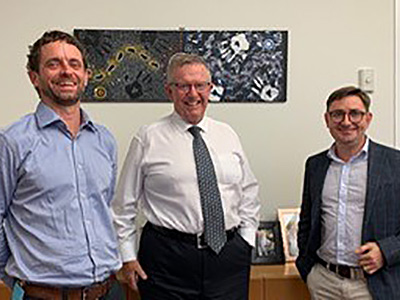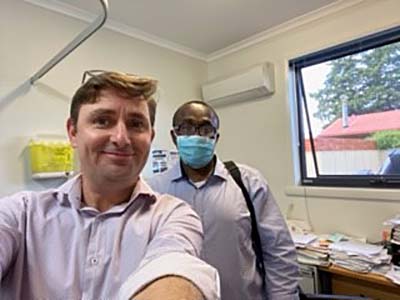Managing Health Outcomes Through a Pandemic
Year in Review with Dr John Hall, Ochre Health’s DMS and President of the RDA
You joined Ochre Health as DMS in February before the impact of Covid was being felt here in Australia. How would you describe such an unprecedented year?
It's fair to say it’s been a bit of a roller coaster. Within three weeks of starting at Ochre Health, we were in the grips of a global pandemic which dramatically changed my focus. We had numerous emergency meetings with our doctors and nurses on the ground with multiple policy updates on how to best manage Covid across our 46 sites. It was all a whirlwind to be honest. But it's been so rewarding going to work every day and being part of a team focused on delivering high quality healthcare for our patients and our communities in spite of Covid. And also supporting our incredible staff who were out there doing the hard yards every day.
How did Covid affect Ochre Health's ability to keep staff working and sites open?
Covid has had a massive impact on general practice and primary care. With the initial lockdowns, people were being told not to leave their houses or go to the doctors or hospitals unnecessarily. There was a lot of fear in the community about contracting Covid from visiting practices. Early on there was certainly a dip in attendance, particularly for non-urgent or more elective health concerns. We had to implement new Covid-safe policies and protocols immediately such as screening at the door, checking people's temperatures and setting up appropriate social distancing within practices.
A game changer for us was the rapid rollout of telehealth by the Federal Government. Without it, general practice as a whole would have been in crisis. This rollout enabled us to access billing Medicare via telehealth very rapidly and it underpinned the viability of the service for our patients and our doctors. But this also meant there was a huge body of work to be completed internally and everybody pitched in. This was very much a team effort across the group, from practice managers, medical coordinators, our regional nursing team and regional managers, right through to our support staff and executive team in Sydney.
Thankfully we had already commenced a significant digital transformation strategy and already had a number of digital projects underway pre-Covid. We then had to escalate and implement many of those technologies as part of our telehealth solution.
In the end, we came through the worst of Covid and were able to maintain access to services for our patients which is essential. But we were also able to maintain our viability and make sure we were in an economic position to continue to provide our services.
Ochre Health is now functioning in a very different way and this really exciting. We now have the capacity to provide seamless telehealth services to our patients, which is particularly beneficial for our rural communities.
How were you involved with the rollout of respiratory clinics in rural and remote Australia?
As the pandemic unfolded, the Federal Government also moved quickly to set up the GP-led respiratory clinic testing sites which effectively helped to remove patients at risk of Covid from GP surgeries to provide an extra layer of safety. Initially it looked like the majority of these new clinics were going to be situated in urban areas so we lobbied extensively to make sure they were evenly distributed across the country. Ochre was then very grateful to be able to manage a number of these rural and remote clinics, from Bathurst in NSW to St Helens in Tasmania, which were rolled out rapidly and were adequately funded. Again, this was another strong initiative from the Federal Government that we were privileged to be a part of.

RDAA Board Member Simon Quilty, Minister for Regional Health Mark Coulton with our very own Dr. John Hall
Have you seen any negative primary health outcomes emerge from this transition during Covid?
We predicted early on in Covid that we would see a significant drop-off in health outcomes based on the fact that people weren’t attending GP practices. And we know there’s a direct link between regular attendance and better health outcomes, particularly for our patients with chronic disease like diabetes and chronic airways disease. Those types of conditions need ongoing support and regular monitoring. Thankfully however we have managed to maintain our health outcomes, which have remained significantly above average. This is a testament to the hard work of our doctors and nurses on the coalface who have maintained contact with their patients through this time. Our operations team have been incredible, enabling us to deliver our digital transformation in such a way that it's enabled us to function, as close to as normally as we could, in the context of a global pandemic.
What role did Ochre Recruitment play to provide continuity of care with the ongoing supply of doctors during this challenging time?
Ochre Recruitment is a massive strength for Ochre Health as a business both in terms of locum support and permanent doctors. Ochre Recruitment played an essential role in maintaining our services in many of our rural and remote sites across the country. There was a huge piece of work to get right around border closures and restrictions in a rapidly changing situation. It meant our pool of doctors was significantly smaller due to these restrictions and it got to the point where even essential healthcare workers weren’t allowed to cross state borders without strict quarantine requirements. Ochre Recruitment did a stellar job of working with what they had, and still managed to fill the majority of vacancies to ensure ongoing service delivery.

Dr. John Hall with Dr. Magnus Agomo at Ochre St Helens
Have you had any locum experiences yourself during the pandemic?
I had the pleasure of working with Ochre Recruitment and filling shifts in some of our remote Tasmanian sites. It was so valuable to experience what our doctors and nurses were going through managing patients during the height of the pandemic, and all of the anxieties and stresses that goes with that. It really highlighted to me how brave and committed so many of our workers are to put themselves out there on the front line. They're vulnerable and as we've seen overseas, there have been a huge number of healthcare workers impacted personally by contracting Covid. Our Australian doctors and nurses took on the challenge and were brave in the face of not only a community threat but also a personal threat.
How have you been involved with the development of Covid vaccines here in Australia?
As President of the RDA, I've been involved in regular meetings with the Department of Health in Canberra and have been updated on the evolving Covid situation on behalf of our rural doctors. During this time, we have also been informed about the vaccines in development and involved with the strategy around delivering these vaccines once they’re approved.
We also share an office building in Canberra with the research company developing the Novavax vaccine which is one of the front running vaccines out of the US. We partner with them to source volunteers for their trials. Many of our patients and doctors in Canberra got on board and are now participating in these trials including myself and our co-founder Hamish Meldrum. Both of us have been vaccinated and it's all going very well.
What’s it like being part of a vaccine trial?
It's a fairly full on process involving three vaccine injections and multiple visits back to the lab for health checks, blood tests and regular Covid swabs. But it's exciting to be involved in clinical research in this way and I think it’s really important to be part of the Covid solution at a community level.
Preliminary data from the phase one trials are quite promising. This will probably be one of the vaccines to be used in Australia alongside some of the other vaccine candidates from Oxford University. There was a massive question mark over whether or not we would be able to develop a COVID vaccine that worked so it’s been thrilling to see strong efficacy data coming through. Knowing we've got some vaccines that are very effective is really reassuring.
Timeline wise, we're looking at these vaccines being in the community by March next year. Here at Ochre, we're already planning the logistics of how we're going to manage such a massive vaccination program which will be a big focus for us in 2021.
Thanks so much John and we look forward to chatting further in the New Year.
---
Doctors interested in joining the Ochre family can either register online or email [email protected]
We can help you find your ideal locum or permanent medical job. Even if you are just curious to see what's out there, we'd love to hear from you.




